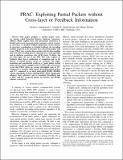PRAC: Exploiting partial packets without cross-layer or feedback information
Author(s)
Angelopoulos, Georgios; Chandrakasan, Anantha P.; Medard, Muriel
DownloadPRAC.pdf (302.9Kb)
OPEN_ACCESS_POLICY
Open Access Policy
Creative Commons Attribution-Noncommercial-Share Alike
Terms of use
Metadata
Show full item recordAbstract
This paper proposes a partial packet recovery scheme, called Packetized Rateless Algebraic Consistency (PRAC). PRAC exploits intra and inter-packet consistency to identify and recover erroneous packet segments, without recourse to cross-layer or detailed feedback information. In the absence of cross-layer coordination or detailed feedback, the prevailing methods proposed in the literature have discarded packets with errors. PRAC uses a rateless linear packet code for data encoding and an iterative decoding process consisting of a search algorithm and an algebraic consistency rule (ACR) check. It allows, but not relies upon, the use of any PHY FEC code, requires no feedback other than a notification of completion and, in the absence of partial packets, incurs no overhead. Our implementation and experimental results in a 7-node indoor testbed using wireless boards equipped with CC2500 radio transceivers reveal that PRAC offers an average throughput gain of 35% compared to a baseline ARQ scheme discarding partial packets and 13% compared to an ideal genie-aided HARQ (iHARQ) scheme. Specifically for links with high PERs, PRAC significantly enhances their robustness and its maximum throughput gain is 148% and 34% compared against the baseline and iHARQ schemes, respectively.
Date issued
2014-06Department
Massachusetts Institute of Technology. Department of Electrical Engineering and Computer ScienceJournal
Proceedings of the 2014 IEEE International Conference on Communications (ICC)
Publisher
Institute of Electrical and Electronics Engineers (IEEE)
Citation
Angelopoulos, Georgios, Anantha P. Chandrakasan, and Muriel Medard. “PRAC: Exploiting Partial Packets Without Cross-Layer or Feedback Information.” 2014 IEEE International Conference on Communications (ICC) (June 2014).
Version: Author's final manuscript
ISBN
978-1-4799-2003-7